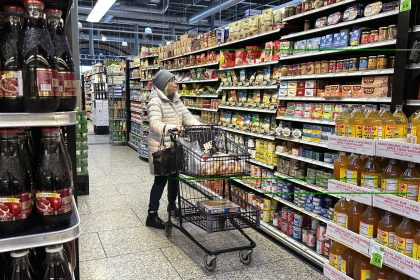Where Small Businesses Are Feeling the Most Pandemic Pain

In Austin, Texas, they’re expecting more closures. In New York, they’re struggling to pay the bills. In San Francisco, they worry that the old normal is never coming back.
Small businesses are often described as the heart of the U.S. economy. They employ about half of the country’s private workforce — and they’ve been hit especially hard by the pandemic. But the impact varies widely from region to region, depending on things like the severity of lockdowns and the local mix of industries.
The latest Small Business Pulse Survey by the Census Bureau, based on responses collected Aug. 9-15, offers a glimpse of how small U.S. firms see their prospects, five months into the worst economic slump in generations. Most said there’s still a way to go before business gets back to normal — if it ever does.
Nationwide, about a third of the companies said they’ve experienced a large negative effect from the pandemic. Roughly one in 20 expect to permanently shut down in the next six months.
The latter figure is substantially lower than worst-case scenarios outlined when COVID-19 first hit America. That’s testimony to the resilience and adaptability of small firms — and the help they’ve gotten from government initiatives like the Payroll Protection Program, which offered a mixture of grants and loans.
“Thus far, the U.S. appears to have avoided the surge in COVID-19-related permanent business shutdowns that many feared at the pandemic’s onset, likely because the PPP and other policy support helped businesses survive the sharp pullback,” Goldman Sachs economists wrote in a report this month.
Still, the overall numbers mask some sharp variations by region. In the week before the survey, for example, 4.2% of small firms in the San Jose area and 3.8% in San Antonio said they had closed a location, while the nationwide figure was 1.3%.
Looking ahead to the next six months, it was businesses in Austin, Texas — a hub for the kind of nightlife that’s been curtailed by social distancing — that showed the highest levels of anxiety.
The survey found that only 3% of firms have missed a loan payment (excluding debts that have been forgiven or postponed) since March 13 — the date when President Donald Trump declared a national emergency, and the one chosen by the Census Bureau as a starting point.
The highest levels of debt distress were found in a handful of urban areas in the industrial northeast, led by Pittsburgh.
But another survey question that expanded the net to include other kinds of scheduled payments — like rent, utilities or payrolls — revealed more widespread problems. Almost 10% of firms nationwide said they had missed at least one payment, and in New York City the figure was nearly twice that level.
Overall, most small businesses do see light at the end of the tunnel — even if they don’t expect a full recovery until well into 2021. But a significant minority don’t think they’ll ever return to normal. On that count, firms in San Francisco proved the most pessimistic.
The survey found a notably more optimistic outlook in southern cities. Memphis, Indianapolis, Orlando and Jacksonville were among the metro areas where fewer than 5% of surveyed businesses said the coronavirus had changed their operations forever. Cheeriest of all were firms in Charlotte, where the figure was just 1.5%.
———
©2020 Bloomberg News
Distributed by Tribune Content Agency, LLC.
























